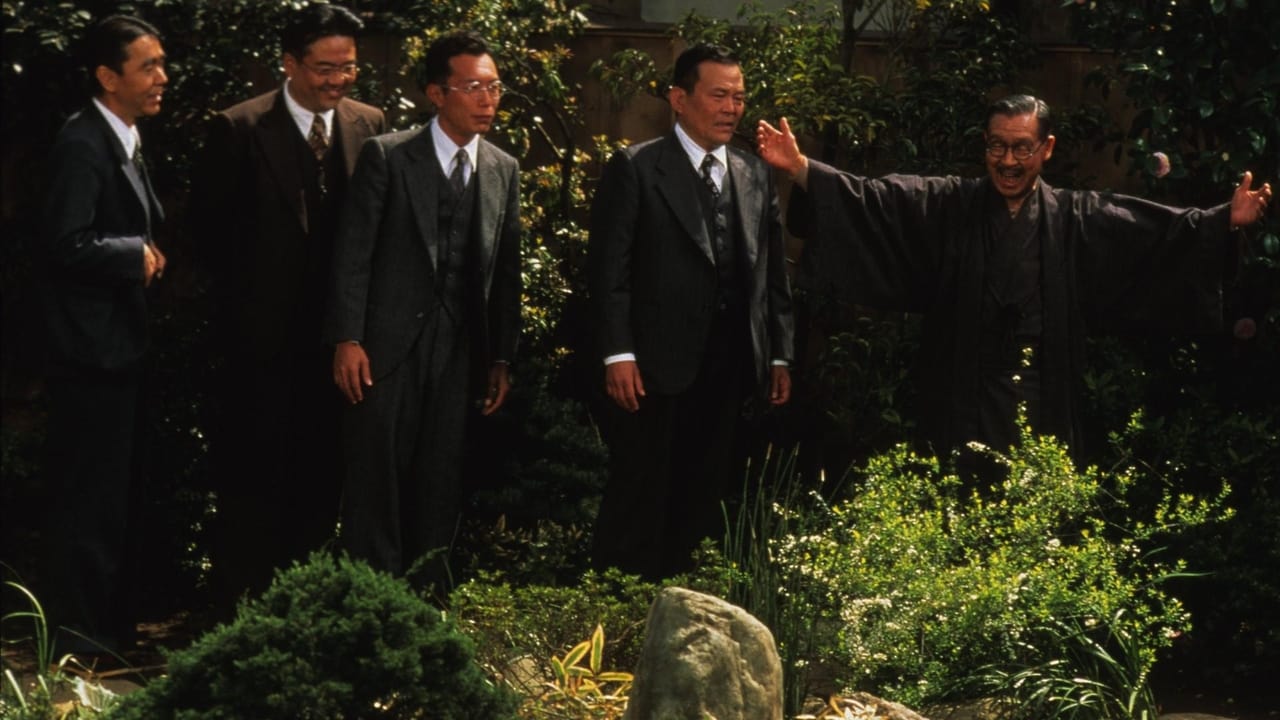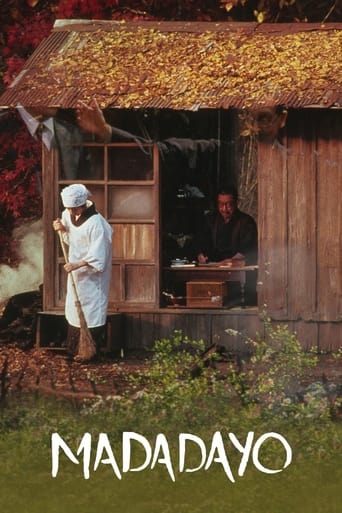Aleksandar Sarkic
Madadayo was last movie of legendary director Akira Kurosawa, and what a great way to end fantastic directing career spanning 50 years. I have watched nearly more than half of his work, but somehow i didn't watched Madadayo to this day, and i have missed a lot, this movie is beautiful. It is long and slow paced like many others Kurosawa's movies, but it's worth in the end, ending is simply beautiful it is sad but peaceful at the same time, like every other natural death. The most i like in this movie is the message to be good in your life to yourself and to others and you will live the peaceful quite life to the end, the connection of professor with his students is very touching, from beginning to the end. I see that many people complain on the part of the movie with missing cat, but i also like that part, and see the coming of new cat as metaphor for never ending circle of reincarnation. I am really recommending this movie to all lovers of Akira Kurosawa's work and Japanese cinema, and to all people who still have soul and heart, i am not recommending to people who don't like slow paced movie and movie with many dialogues. My grade 8/10.
Andres Salama
Akira Kurosawa's last film, from 1993, didn't attract a lot of attention when first released, perhaps because the Japanese master was already a bit out of fashion among the critics and the public in the 1990s, but this is among his best movies. Kurosawa was 83 when he directed this (he would die five years later) so in many ways this is a film about old age and about dying, but is far from somber or depressing – it's hard to think of a more elegiac film about death (it is also, of course, a film about life).The movie's protagonist is Hyakken Uchida (1889-1971), who was a real Japanese professor of German Literature, but in many ways he is in the movie an alter ego of Kurosawa, an aging master facing old age and death. Uchida is kind hearted sometimes to the point of naiveté. Plotwise, not much really happens in this slow but rewarding film – we see Uchida the day of his retirement, facing the destruction of his home during World War II, celebrating with his former students each year in a party, finally facing illness and old age. Perhaps the biggest incident in the movie is when Uchida loses his cat. But if the plot seems slight, the movie stands out as a beautiful piece of humanist filmmaking. The quietly beautiful photography and mise en scene certainly helps.
lsaul-2
>>>The professor is Hyakken Uchida (Tatsuo Matsumara, his first film for Kurosawa)Not true. Matsumara appears in a fairly important role in Dodeskuden (1970).**He is brilliant here. The professor's love for his students, his cats, and his wife seem unspeakably profound. Although there are many scenes where he gets extremely emotional and cries, there are just as many shots of his serene face, still and not speaking.And -- as usual -- the careful structure, the pacing with scenes, the rhythm of the cutting -- is all quite magical.The cast is splendid -- the adult students are all given wonderful characterizations (i.e. the one who recites all the subway stops!)LS
Chris Knipp
Kurosawa's last film was released in the US at his death, five years after it was made. It's the story of a retired schoolteacher and it's unabashedly sentimental and heartwarming, but unlike the lonely old man of the famous English schoolteacher tale Goodbye, Mr. Chips who has to be humanized and refuses to retire, Hyakken Uchida (Tatsuo Matsumura) is different from other men in his oddball attitude and intellectual accomplishments but neither lonely nor sad, and the story begins with his very willing retirement. He's both a mischievous joker and a happily married man who likes to stay up all night drinking and singing with his ex-students in all the years that follow that retirement depicted in the film. Uchida's quirky individuality is celebrated by his admirers, and the film depicts him solely in his relationship with them. They give him lavish presents (including after WWII a nice house with a liquid garden) and an annual birthday party, and they cherish his spirit, his personality, and his funny, thought-provoking remarks.Madadayo is based on a series of books in turn drawn from the life of an actual military school teacher. Teacher -- sensei -- of course has a special sense in Japanese. It's a role one takes on for life, and one's "sensei" is a permanent attachment based on admiration and respect. Corny and sentimentalized as this "sensei" is, he's a richly charming character and the way his former students carouse with him and cherish him before, during, and after the War is expressive of some of the best aspects of Japanese culture.At the annual parties, the ritual is that the sensei's students chant, Mahda kai?" (are ready?) and he sings out, "ma-da-da-yo!" (not yet!). But though he may not go gentle into that good night, he does accept old age with good humor. Madadayo is about growing old, about growing old frankly, growing old gracefully, about being useful as one grows old through dignity and humor, about the mutual benefits that accrue when the old receive the respect of younger generations. It's about old-fashioned loyalty to one's school, and about respecting and honoring eccentricity and respecting and honoring the intellectual type. The former students, who are doctors, lawyers, business men, and so on, recognize that in his oddball impracticality, his "absent-minded professor" style, their sensei possesses wisdom and creative individuality they lack and they always say he's "pure gold." One might imagine them proposing him for designation as a "national treasure." Sensei is absurdly weak and vulnerable at times, witness his emotional collapse when his wife's male cat Nora disappears and he goes to pieces with grief. But importantly he articulates this grief eloquently and with a certain detachment for his ex-students. And they respect his peculiarities so much that they send out an all points bulletin for Nora and are gravely concerned for his return. (It never comes, but the sensei's wife finds another cat and eventually both are memorialized by handsome gravestones in the garden.) However silly he is, his behavior is simply more enthusiastic and emotional than others', and finally this sensei simply represents what is wisest and most human.And sensei's wife represents a perfect, idealized traditional Japanese woman (without the function in her case of mother, however), always deferential, formal, polite, sweet, but elegant and noble, the repository of hospitality, the hearth, loyalty, goodness, patience, steadfastness: you can't help being impressed by the actress Kyôko Kagawa's supple, unflaggingly consistent, energetic but restrained performance, comparable to Tatsuo Matsumura's. As the sensei, Matsumura is an initially off-putting but ultimately irresistible and splendidly rich character -- pitiful, cute, wise, silly, tough, stridently singing his old songs and making his imperishable jokes which his many admirers never fail to laugh at loudly and delightedly. They need him tremendously -- this is the film's chief message, to value special people as they age -- and so they take wonderful care of him. When the film begins, his book sales have enabled him to retire and focus on writing in a small house. When the War comes it's completely destroyed by Allied bombs and he and his wife live in a tiny hut. At the end of the war the students build a lovely spacious house with a garden made up entirely of a "donut" shaped pool in which carp the sensei fancifully describes as "giant" can swim around endlessly.Many of the scenes are Ozu-like in their quietude and use of a stationary camera as the sensei sits with his chief admirers and drinks and talks, usually with his wife sitting by to supply food and drink. But there is a large cast of characters and in the final annual birthday dinner women and children and grandchildren are now present. The drinking of a large stein of beer by the sensei before he performs the "Mahda kai?""Ma-da-da-yo!" ritual and gives his amusing speech is probably based on Germanic practices: Uchida taught German and must have studied in Germany.The sensei's unflagging spirit and humor and his former students' equally unflagging devotion make for an inspiring and beautiful fantasy. It is a wise and pleasant dream, and Kurosawa's charming evocation of it speaks well of his final years.The film was made in 1993, released in the US in 1998 when Kurosawa died, re-released in 2000. It is timeless, and any year is a good year to get to know it and chew over its many, many endearing passages.

